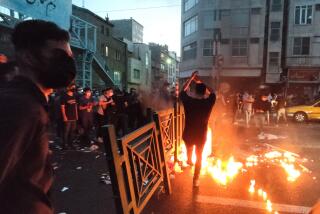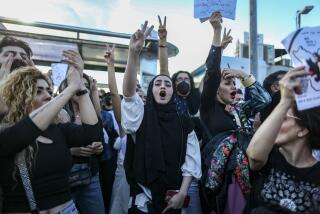Voice for democracy muffled by Musharraf
- Share via
LAHORE, PAKISTAN — Inside a gated two-story home in a fashionable section of this ancient city sits a woman the government appears to fear the most, biding her time, smoking one cigarette after another.
Outside, fidgety policemen with AK-47s make sure no unauthorized person goes in or out. Twice this week, the guards burst into the house, panicked by reports that their charge had somehow slipped past them and out onto the streets, where she allegedly poses a threat to national security.
Asma Jahangir is no terrorist. She is not a hardened criminal. She is a tough-minded, self-taught, internationally admired lawyer who has spent most of her adult life speaking out for democracy and against military leaders such as Pakistan’s president, Pervez Musharraf.
For her insistence that the government obey the constitution and respect individual rights, Jahangir was put under house arrest Saturday, within hours of Musharraf’s declaration of a national state of emergency.
Musharraf said that action was necessary to stanch an Islamic insurgency in outlying regions along the Afghan border, such as the Swat valley and the Federally Administered Tribal Areas, or FATA. But security forces have swooped down instead on hundreds of lawyers and human rights activists like Jahangir. Her 90-day detention order charges activities “prejudicial to public safety and maintenance of public order.”
“I don’t know why he thinks I am the most dangerous person in Pakistan. He’s obviously forgotten the people in Swat area and FATA area and the militants who are hanging around,” quipped Jahangir, reached by telephone at her home Tuesday. “I suppose anyone who calls a dictator a dictator is dangerous and imbalanced.”
It was a flash of humor from a woman regarded as a symbol of courage and conscience, who says things many Pakistanis wish they could but do not dare.
Now 55, Jahangir has campaigned since she was a teenager against military rulers who have held sway over Pakistan. More than once, her willingness to speak out and protest in the streets has landed the diminutive woman in jail.
The organization she helped found in 1986, the Human Rights Commission of Pakistan, has championed women’s rights, demanded an end to bonded labor, challenged blasphemy laws, defended media freedoms and exposed official corruption.
Jahangir’s work has drawn praise from around the globe, including recognition by the American Bar Assn.
This year, the rights commission took on the country’s most powerful institution, the army, demanding an accounting of hundreds of men and women believed kidnapped and “disappeared” by intelligence units.
The petition made it to the Supreme Court, where it was heard by a sympathetic chief justice, Iftikhar Mohammed Chaudhry, before Musharraf tried to sack him in March. That act sparked nationwide protest and spurred the democracy movement Musharraf seems intent on suppressing.
Police have arrested thousands of people, including independent-minded members of the judiciary -- lawyers and judges whom Musharraf accuses of undermining his efforts to protect Pakistan.
“This is the kind of rule they want: a police state, a complete police state,” Jahangir said.
About 70 members and supporters of her commission were arrested Sunday after police raided a meeting at the group’s headquarters. They included attorneys, teachers and social workers, a cross-section of Pakistan’s burgeoning urban middle class. Bail orders were signed Tuesday morning, and a majority were released by late evening.
Unlike her colleagues, Jahangir stands no chance of bail. Her confinement falls under a different category, that of “preventive security.” The warrant against her alleges she is likely to deliver “inflammatory speeches” that would incite the public.
Not even former prime minister and Musharraf rival Benazir Bhutto, who has promised a huge political rally Friday, is under such restrictions.
“Asma Jahangir must be freed at once,” said Chris Patten of the International Crisis Group. “Musharraf’s actions are completely unconstitutional, and he has no legal basis to hold Asma or any of the others wrongfully detained over the past few days.”
When the midnight knock on Jahangir’s door came with the detention order, she was ready for prison.
“I made sure to have my carton of cigarettes,” she said. “I was thinking that, if I’m in jail, I should have something to sustain me.”
By most accounts, what sustains Jahangir is not just nicotine but unflinching idealism in the face of long, perilous odds. Even those who at times have questioned her judgment and tactics credit her with never deviating from her vision of the rule of law and a secular, stable Pakistan.
“She is an activist who is a staunch believer in civil liberty and human rights,” said Ahmad Awais, former president of the Lahore High Court Bar Assn. “This is a fundamental principle for her.”
It is an outlook inherited in large part from her father, Malik Jilani, a civil servant who quit his job to protest Pakistan’s first military coup, in 1958. He was in and out of prison after that, and Jahangir has said accompanying her mother to her father’s court appearances impressed on her the majesty of the law.
Law in Pakistan was a male-dominated profession at the time, considered unsuitable for a woman, forcing Jahangir to teach herself at home. By then, she had already begun forging her activist credentials: landing in trouble in school at 17 for organizing a women’s protest against military rule.
When Jahangir, her sister and two other women founded the law firm AGHS, after their initials, male counterparts referred to them as “Hags.” Revenge was success, especially in high-profile cases. Jahangir once represented a blind woman who had been gang-raped -- and then charged with adultery under Islamic law.
A vocal foe of religious fundamentalism, Jahangir has grown accustomed to death threats. She and her businessman husband sent their three children to boarding school abroad partly out of fear for their safety. Her brother and his family were once taken hostage to intimidate her, an ordeal she has described as one of the worst episodes of her life.
With a kindly, intelligent face, Jahangir in person is neither large nor imposing. Her reputation is.
“She’s one of those people we can look up to,” said Ayesha Batool, a 21-year-old student. “I admire her courage for what she’s doing. If I were doing it myself, maybe I’d have some reservations. And she’s not doing it for herself, but for us.”
The man in the bull’s-eye of Jahangir’s criticisms is apparently not so generous.
“Musharraf has repeatedly said that he despises Asma,” said Ali Dayan Hasan, who is based in Lahore for Human Rights Watch. “Basically, he offered her all sorts of things, including a Cabinet position, but she said, ‘Look, I’m a human rights activist . . . and I can’t support a military regime.’ She wouldn’t be co-opted.”
Right now, Jahangir, holed up at home, is more sad than afraid.
“I’m not fearful for myself, because I’ve seen adversity and I can see it again,” she said. “But I feel very upset and anguished when I see images of young lawyers beaten up. . . . People send their kids to law school to uphold the rule of law -- not to fight in the streets for justice, and not to be beaten up.”
She has no illusions about what will happen when her three-month detention order is over. She said she’s certain that if Musharraf wants her to remain under confinement, his government will find a way to make it happen.
“They can have their 90 days, and they can do what they want, but I hope they cannot break our spirits,” she said. “When there is oppression and dictatorship, by not speaking out we lose our dignity. The whole country is a hostage, and if I’m under arrest it’s no big deal.”
More to Read
Sign up for Essential California
The most important California stories and recommendations in your inbox every morning.
You may occasionally receive promotional content from the Los Angeles Times.











